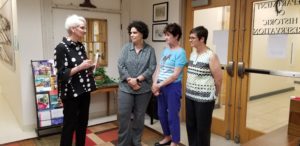The University of Mary Washington Center for Historic Preservation is proud to award this year’s Book Prize to Detroit Remains, by Krysta Ryzewski. Detroit Remains is a collection of six case studies in Detroit, Michigan, ranging from bootlegging, a log cabin, jazz site, and Detroit counterculture. This well-researched book masterfully blends an archaeological approach to historic preservation. Dr. Ryzewski highlights the crucial importance of community engagement – and student involvement – in effective documentation and action. The book engages economically, socially, and racially diverse groups, and emphasizes the relevance of recent history, which is still underrepresented in the literature.
Detroit Remains highlights how history can be reassembled even when the physical site is already lost. Dr. Ryzewski also emphasizes that some mystery always remains, even after thorough analysis, which both points to the limits of our research and its next steps. The book provides practical tools, tips, and lessons learned for people working in urban archaeology. Setbacks are openly discussed, providing a road map for dealing with conflict. Though the book narrowly focuses on Detroit, it has broad application, largely thanks to its diverse sites and communities. Self-branded as archaeology, Detroit Remains nevertheless illustrates how contemporary preservation can effectively work with the recent past.
The University of Mary Washington Center for Historic Preservation has awarded this prize annually since 1989 to the book (or books) with the most potential for positively impacting the discipline of historic preservation in the United States. In making its selection, the jury focuses on books that break new ground or contribute to the intellectual vitality of the preservation movement. Winners receive a monetary prize and are invited to give a lecture at UMW. The jury was comprised of preservation academics, professionals, alumni, and a current student.
2022 University of Mary Washington Book Prize Committee:
Andréa Livi Smith, Ph.D., Professor of Historic Preservation, University of Mary Washington (Chair)
Michael Spencer, Associate Professor of Historic Preservation, University of Mary Washington
Brooke Prevedel, UMW Class of 2024, Historic Preservation and Classical Archaeology, University of Mary Washington
Lindsey Cochran, Ph.D., Assistant Professor of Anthropology, East Tennessee State University
Karen Daley, President of Stratford Hall

